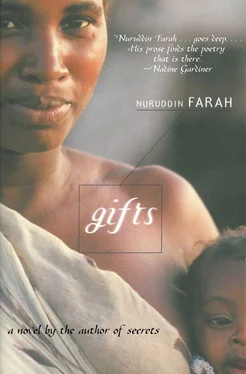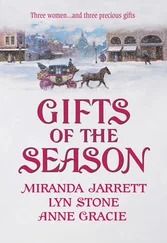Nuruddin Farah - Gifts
Здесь есть возможность читать онлайн «Nuruddin Farah - Gifts» весь текст электронной книги совершенно бесплатно (целиком полную версию без сокращений). В некоторых случаях можно слушать аудио, скачать через торрент в формате fb2 и присутствует краткое содержание. Год выпуска: 2011, Издательство: Arcade Publishing, Жанр: Современная проза, на английском языке. Описание произведения, (предисловие) а так же отзывы посетителей доступны на портале библиотеки ЛибКат.
- Название:Gifts
- Автор:
- Издательство:Arcade Publishing
- Жанр:
- Год:2011
- ISBN:нет данных
- Рейтинг книги:3 / 5. Голосов: 1
-
Избранное:Добавить в избранное
- Отзывы:
-
Ваша оценка:
- 60
- 1
- 2
- 3
- 4
- 5
Gifts: краткое содержание, описание и аннотация
Предлагаем к чтению аннотацию, описание, краткое содержание или предисловие (зависит от того, что написал сам автор книги «Gifts»). Если вы не нашли необходимую информацию о книге — напишите в комментариях, мы постараемся отыскать её.
Gifts — читать онлайн бесплатно полную книгу (весь текст) целиком
Ниже представлен текст книги, разбитый по страницам. Система сохранения места последней прочитанной страницы, позволяет с удобством читать онлайн бесплатно книгу «Gifts», без необходимости каждый раз заново искать на чём Вы остановились. Поставьте закладку, и сможете в любой момент перейти на страницу, на которой закончили чтение.
Интервал:
Закладка:
Then the old woman stretched out her hand to touch the baby. On the back of her wrist there was a ganglion, prominent as a hump. “You have not gone to work today, have you, for instance?”
“My not going to work had nothing to do with the baby,” said Duniya.
“I mean, you may not be able to go to work tomorrow?”
The old woman was anticipating quick decisions, things Duniya had not given thought to before. This was because a lot had not been thought out, and no one knew what would happen, least of all Duniya.
“Your daughter knows where we live, not very far from here,” the woman was saying to Duniya, “remember, my grand-daughter’s name is Marilyn,” and she shook her head sadly. “Mind you, it is not that I begrudge this American actress anything, but I always wished my grand-daughter to remember that she was named for me, and not after some American nude embellishing frustrated men’s fantasies and rooms; besides, I will not live for ever. But there you are.”
Unceremoniously, she got up to leave, taking each step as though it were an ordeal She stopped in the doorway to say, “Remember not to hesitate. We can help provide a baby-sitter.”
“Yes, I’ll remember the name Marilyn,” Duniya promised.
A man was saying Hoodi-hoodi and another was talking non-stop, trying to make a point. Bosaaso was announcing that he and Mataan were back, and the young man was eager to impress the older one. When the old woman walked past them, on her way out, in deference to her age they stepped out of her way and fell silent.
Then Bosaaso said anxiously, “The inspector, who sends his best wishes, says no one has reported a missing baby, nor has anyone else reported seeing one near a rubbish-bin. He says he is grateful to be informed and glad to know the foundling is in your capable hands, and he trusts that his presence won’t create inconvenienced.”
Duniya nodded her head silently.
“But bureaucracy being what bureaucracy is,” Bosaaso continued, “the inspector suggested you and I register as co-guardians, since it was I who reported the case in person and signed the statement.”
“You and I as co-guardians of the foundling?” Duniya said, asking herself what, in the future, this would mean. She also wondered whether or not he had taken her for granted.
“The inspector wondered if Bosaaso was willing to put down his name as co-responsible — that’s the word he used — just to be on the safe side,” Mataan said, “and that’s what we did, put your names down as co-responsibles for the foundling.”
There was something she did not like about the whole thing, but she was not sure what. Could it be that an unmarried woman, in her mid-thirties, with school-going teenagers would not be able to look after another baby, a foundling at that? Could it be that the inspector who knew her thought putting down Bosaaso’s name as co-responsible would look good on paper?
“The inspector confessed,” Bosaaso said, “that he had no idea about the legal status of such foundlings and those who happen to find them, since all this is a recent phenomenon, as he put it, part of this permissive society’s reward to itself.”
Mataan added: “I quoted to the inspector the Somali proverb: Whoever finds an unclaimed item, let that person appropriate it.”
“The inspector took us to task, asking lots of questions we had no way of answering,” explained Bosaaso. “Frankly it didn’t help matters when Mataan said Nasiiba knew a lot more than she’d told.”
“What made you make such a stupid remark?” Duniya said to Mataan.
“I’m sorry, Mother,” said Mataan, “but the truth is Nasiiba knows a lot more than she has told us, and she must be made to tell it.”
“Why?”
“For the good of everybody concerned.”
Duniya placed the sleeping baby gently back in his cot and turned on Mataan. “Do I ever ask you to tell me all you know about… everything and everybody? Aren’t there areas of your life that remain your private affair? Do I ever ask you how you spend your time or who your friends are, Mataan?”
“No,” he agreed, “but this is different.”
“Suppose she says she won’t tell us anything. What am I to do? Beat her up? Throw the foundling back into the rubbish-bin? I won’t press Nasiiba to tell me anything she doesn’t want me to know,” said Duniya. That dealt with, she said to Bosaaso, “How did the two of you manage to register the foundling?”
“I made a statement, which I signed,” said Bosaaso. “Because you weren’t with us, Mataan countersigned it. We gave as much detail as we had. The inspector opened a file labelled ABANDONED BABY CARE OF DUNIYA. He told us he would release word to the press, especially Radio Mogadiscio. We have to report back to him once we have taken the baby to the hospital for a thorough medical examination, at our own expense, which I didn’t object to. The idea is to allow time for the foundling’s parent or parents to have a change of heart; and because a paediatrician might find reasons why the parents abandoned him in the first place. In other words, is the baby well or ill?”
“And then what?” Duniya asked.
“A board will decide whether to entrust us with responsibility for raising the foundling, since we are in effect co-responsibles.”
“You and I?” Duniya said, feeling amused, humoured.
“And then following an appearance before a board, it will be decided if we are fit to be his parents.”
“On the condition that we are married?” Duniya asked.
“Maybe.”
“Enough of that,” Duniya said.
They fell silent and no one spoke for quite a time. Then the baby’s lungs exploded with a most furious cry surpassing in tension the one he emitted earlier when left alone with Duniya. As everyone began to fuss over him, their voices silenced him, comforted him.
To help quiet the foundling, Mataan told an Arab folktale:
One day Juxaa, the wise fool, invited a number of friends for a meal but discovered that he didn’t own a large enough cauldron to cook in. He borrowed one from a neighbour, promising he would return it.
The following afternoon Juxaa returned the huge pot he had been lent, but he put a smaller cauldron inside it. The neighbour reminded him that he had loaned him only the big one. Maybe the small pot had been borrowed from another neighbour?
“Your large cauldron, come to think of it, gave birth to a small one overnight,” said Juxaa. “I thought it unfair to conceal this miraculous birth from you. Given the situation,” Juxaa assured him, “both the big and the small pot are yours, and you may keep them.”
The neighbour was highly impressed and described Juxaa as a very trustworthy gentleman of rare breed. The two men parted, each praising the other and Allah as well.
A month or so later Juxaa borrowed the great cauldron from the same neighbour for a similar purpose, to give a feast. When Juxaa didn’t return the huge pot on the promised day, nor even a week after that, the neighbour went in person to Juxaa’s house, asking to be given back his property.
Juxaa hung his head, saying, “I’m sorry I forgot to come and commiserate with you, for your huge pot died and we buried it.”
“Died?” asked the neighbour in utter disbelief.
“That’s right. It died and we buried it.”
The neighbour burst into a wicked laugh. “Now whoever heard of a brass cauldron dying and being buried?”
“Come to think of it,” retorted Juxaa, “neither had anyone else ever heard of a large brass pot giving birth to a smaller one.”
Defeated, the neighbour went away, bothering Juxaa no more.
8
In which Duniya’s half brother turns up and the old animosity between them is revived. Duniya’s younger daughter from her second marriage visits. But it is Bosaaso who comes first thing in the morning.
Читать дальшеИнтервал:
Закладка:
Похожие книги на «Gifts»
Представляем Вашему вниманию похожие книги на «Gifts» списком для выбора. Мы отобрали схожую по названию и смыслу литературу в надежде предоставить читателям больше вариантов отыскать новые, интересные, ещё непрочитанные произведения.
Обсуждение, отзывы о книге «Gifts» и просто собственные мнения читателей. Оставьте ваши комментарии, напишите, что Вы думаете о произведении, его смысле или главных героях. Укажите что конкретно понравилось, а что нет, и почему Вы так считаете.











